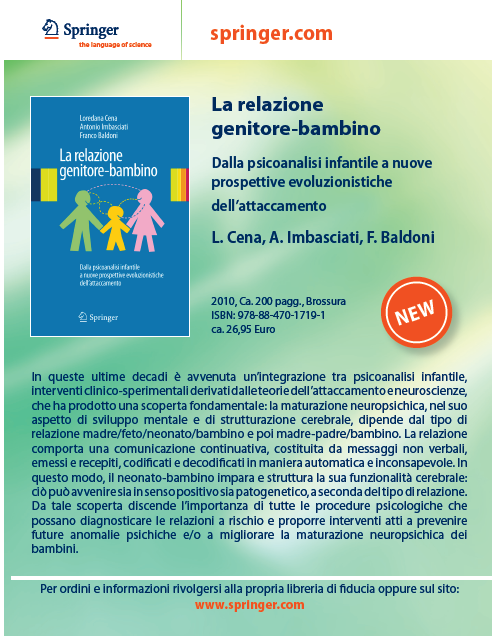
Parents-child Relationship
In this last years infant-psychoanalysis has much developed and an integration with Attachment Theory’s researches and techniques happened: so many and different Psychotherapy Schools developed. These psychotherapies are focused on the mother (or caregiver) rather than on the child, chiefly if he is not a baby. Principal vehicle of the communication which incomes between the therapists and his “patients” is not verbal, like adult psychoanalysis. Such a development allowed to discover that therapeutic effect – that is what make mental structures change – also in adult depends on affective messages, vehicled by that non verbal communication which constitutes that specific interpersonal relation. Such a discovery focused the importance and complexity of the interpersonal Relation, as the most structurant situation. Structuring effect, non only psychic but also neural, is the foundation of children brain. Cerebral maturation concept is nowadays changed: it depends from primary relational learning. Structuring effect may be negative too: here is psychopathology, which in little children is silent. Relationship with its continuous non verbal communication is not conscious. Affective messages circulation is automatic and unconscious. A competent therapist must be formed in achieving, but in part, a capacity in being conscious about it. A continuous non verbal dialogue structures baby brain. This structuring may be positive, in generating a good mind development, or negative, in generating a defective or pathological development. The type of this dialogue and its negative/positive effects depends on the quality of parental cares and their mind structure. The authors describe some of the assessments procedures in Perinatal Clinical Psycology in diagnosing babies at risk, so that an appropriate care and psycoterapy of parents can support them in reducing risks in the future baby development.
Therapeutic aims carried on a discovery: a relationship, with his nonverbal communication is always and everywhere acting in human interpersonal situations. As more relation is intimate as more it is acting and its structuring effects increase. Its maximum happens when an adult is caring a child or a baby: here the adult structures child/baby brain. So how important parents-child relation may be was focused: a good psychic and psychosomatic (physical in the baby) development rather than a pathological one will depend on the relationship quality between parents and their children.
